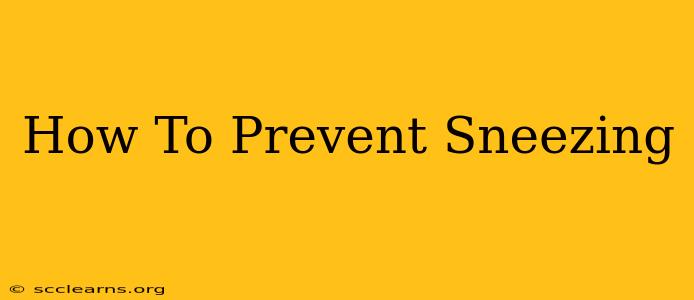Sneezing, that explosive expulsion of air from your nose and mouth, is your body's way of clearing irritants from your nasal passages. While usually harmless, frequent or uncontrollable sneezing can be disruptive and even embarrassing. This guide explores how to prevent sneezing, focusing on both immediate relief and long-term strategies.
Understanding the Causes of Sneezing
Before we delve into prevention, understanding why you sneeze is crucial. Common triggers include:
- Allergies: Pollen, dust mites, pet dander, and mold are major allergy culprits, leading to frequent sneezing fits.
- Irritants: Dust, smoke, strong smells (perfumes, cleaning products), and even bright light can trigger sneezing.
- Infections: The common cold, flu, and other respiratory infections often manifest with sneezing as a prominent symptom.
- Medications: Certain medications can have sneezing as a side effect.
- Spicy Foods: The capsaicin in spicy foods can irritate nasal passages.
How to Stop a Sneeze (Immediate Relief)
While you can't always prevent a sneeze entirely, you can sometimes interrupt the process before it fully manifests. These techniques offer some degree of control:
Pressing Your Tongue to the Roof of Your Mouth
Gently pressing your tongue against the roof of your mouth, just behind your upper teeth, can sometimes halt the sneeze reflex. It's worth a try, but it doesn't work for everyone.
Pinching Your Nose
A firm pinch on the bridge of your nose can disrupt the sneeze reflex for some individuals.
Distraction Techniques
Sometimes, a sudden change in focus can interrupt the sneeze. Try counting backwards from 100 or focusing intently on a specific object.
Long-Term Strategies for Sneeze Prevention
Preventing sneezing long-term involves addressing the underlying causes.
Allergy Management
If allergies are the culprit, consider these steps:
- Identify your allergens: Allergy testing can pinpoint your specific triggers.
- Allergy medication: Antihistamines, nasal sprays, and other allergy medications can significantly reduce sneezing.
- Avoid allergens: Minimize exposure to known allergens by using air purifiers, dust mite covers, and regular cleaning.
Irritant Avoidance
Reduce exposure to irritants by:
- Improving air quality: Use air purifiers and keep your home clean.
- Avoiding strong smells: Opt for fragrance-free products and be mindful of strong perfumes or cleaning solutions.
- Wearing a mask: In dusty or smoky environments, a mask can protect your nasal passages.
Treating Infections
If sneezing is a symptom of an infection, focus on treating the underlying illness. This often involves rest, fluids, and potentially over-the-counter medications.
Hydration: Staying well-hydrated helps to keep nasal passages moist and less prone to irritation.
Lifestyle Changes
Certain lifestyle changes can also help:
- Manage stress: Stress can exacerbate allergy symptoms, including sneezing.
- Maintain good hygiene: Regular handwashing helps prevent infections.
When to Seek Medical Attention
While most sneezing is benign, persistent or severe sneezing warrants a doctor's visit. This is especially true if sneezing is accompanied by:
- Fever
- Cough
- Headache
- Runny nose
- Body aches
- Difficulty breathing
By understanding the causes and employing these prevention strategies, you can significantly reduce the frequency and severity of your sneezing. Remember that consistent management of underlying conditions is key to long-term relief.

